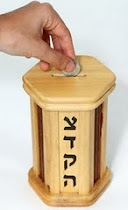Saturday, October 13, 2007
There is the known story of the Rebbe Rashab, of blessed memory, who once responded (at the Rabbinic conference of 1910) to one of the Rabbis who asked him why he is opposing a particular proposal that the government had put forth [concerning Jewish education] so vehemently? What is the proof that the proposal is so dangerous? He replied, because it felt right to him [in the Hebrew, “mipnei she’hunach etzloi kach”].
At first glance, how could he have stood with such vehemence [merely] on the basis of a “feeling,” [in the Hebrew, “hanocho”] without any proof?
Rather, in the case of the heads of the Jewish people the level of the comprehensive Yechidah-soul shines. (This is similar to the ray of Yechidah [that stems from the comprehensive Yechidah-soul] within every person [Jew]. The potential for self-sacrifice stems from this, and this is also the level of Chochmah [“wisdom,” the highest soul-power], (the head) of the soul. See the discourse Podoh Beshalom inSha’ar HaTefillah, ch. 12.) And it is not possible to err in a matter related to the soul-level of Yechidah.
Likkutei Sichos, Vol. 4, p. 1202.
Labels: infallibility
Wednesday, August 8, 2007
Simply repeating what he heard in Gan Eden
0 responses Posted by Yehoishophot Oliver at Wednesday, August 08, 2007The Previous Lubavitcher Rebbe taught:
The concept of a Rebbe is to reveal down here [in this physical world] what he heard in Gan Eden. The Rebbe is the “I stand between G-d and you at that time to tell you the Word of G-d,” (Devarim 5:5) as is written of Moses, our teacher. “To tell you” means “to draw down to you” the Word of G-d.
Likutei Dibburim, vol. 4, p. 1408.
Put differently, a Rebbe does not say a word of his own. This also appears to imply the concept of the Tzaddik’s infallibility.
On a peripheral note, the Gemoro says that there was a difference between the way that the first four books of Chumash were revealed, and the last. The former was dictated word for word to Moshe Rabeinu, while the latter was vested first in Moshe Rabeinu’s mind and then expressed in his own words, albeit exactly according to Hashem’s Will. It is interesting that according to this quote, the divine revelation to a Rebbe appears to fall into the former category.
Labels: infallibility, the Tzaddik as intermediary
Tuesday, July 31, 2007
There is tremendous ignorance, misunderstanding, misinformation, and outright disinformation about the concept of the Tzaddik, the righteous man in Judaism. This goes along with the confusion over the meaning of the Chasidic concept of a Rebbe. A Rebbe is a Tzaddik, but much more. In this blog I hope to correct these fallacies and dispel the confusion through consistent reference to published traditional Rabbinic sources, and also the more recent teachings of the Rebbes of Chabad.
I mention Chabad because I believe that the Rebbes of Chabad have revealed even deeper levels of understanding of the meaning of the concepts of the Tzaddik and the Rebbe than can be found in any other sources, although there are many sources not specifically from the Rebbeim of Chabad that I hope to quote.
In any case, a word of warning: some of the sources presented here may seem strange to those who are unfamiliar with them, but with the help of Hashem through explanation all will be clarified.








